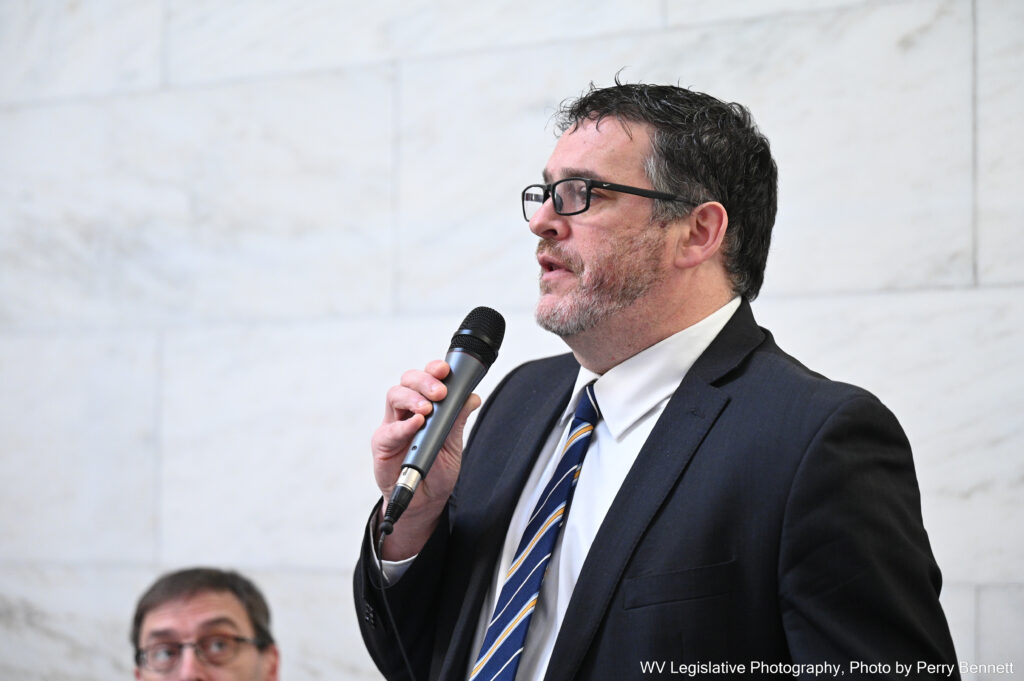The House of Delegates started Friday, Day 59 of the 60-day legislative session, with more than 60 bills on third reading. Many of the lighting rod bills were moved to the bottom of the agenda. Bills passed and sent to the governor include posting our national motto in schools, lowering prescription costs, addressing substandard recovery residences and who should help develop Corridor H.
There was continued pushback from the Democratic Caucus to Senate Bill 152, which is about displaying the official U.S. motto, In God We Trust, in all public schools. The bill says the motto must be displayed properly and conspicuously. Democrats questioned House Judiciary Chair Tom Fast, R-Fayette, on if the motto had to be in English, is taxpayer money footing the bill, and these questions from Del. Joey Garcia, D-Marion.
“Is there any penalty for non-compliance?” Garci asked Fast.
“It does not state so, it just requires a mandate,” Fast answered.
“Is the actual poster board required to be made in the United States?” Garcia asked.
Fast answered, “To the gentleman, and your colleagues, I would suggest you read the bill. It’s only a few paragraphs.”
“Then no, is that the answer?” Garcia responded.
“That is correct,” Fast said.
The national motto in schools bill passed 86 to 10.
Rural Pharmacies
Some delegates said Senate Bill 325 was complicated. Others said not so much. The bill deals with distribution of drugs to safety net providers and contract pharmacies. Under a federal program, it would have pharmaceutical companies cut costs on many drugs sold to pharmacies by 50 percent.
Del. Larry Rowe, D-Kanawha, was among a bi-partisan group urging passage to benefit many West Virginians.
The question is can they discriminate against rural and small pharmacies,” Rowe said. “And this bill is going to say that they can’t do that. And I would remind folks that are concerned about rural hospitals. The governor had $100 million in his original budget for rural hospitals and that is not in a budget that we sent over to the Senate. Maybe we hope that appropriation can be made at some point. But if you want to help small and rural pharmacies and hospitals, vote yes on this bill.”
The pharmacy bill passed 96 to one.
Recovery Houses
Senate Bill 475 would require more review and regulations for unscrupulous substance use disorder recovery residences. The bill will crack down on operators who often pack clients into substandard dwellings and treatment practices to skim federal grant dollars from those who want to get clean and sober.
Del. Mike Pushkin, D-Kanawha, was among those supporting the bill.
“There’s a byproduct of this horrible drug epidemic that has ravaged our state,” Pushkin said. “We need more housing, more safe places for people to get better. And just in any industry, you have good actors, and you have bad actors. And because of some of the bad actors, a lot of us have heard from the residents there, from the residents who live near there, that we needed to do something to help clean up this industry.”
The bill passed 96 to one.
Corridor H
And among the new corridor authorities being proposed, Senate Bill 571 would create the West Virginia Corridor H Advanced Energy and Economic Corridor Authority. Del. Brian Ward, R-Hardy, was one of several delegates opposing what he said would be far away bureaucrats deciding home town development issues.
“All the objectives that this bill outlines is already achievable through one county working with their neighboring county or multiple counties,” Ward said. “This is happening without being tilted too heavily to Governor appointees and industry experts. We’ve got brilliant people in each of our counties. This has got seven counties, Lewis, Upshur, barber, Randolph Tucker, Grant, and Hardy. The 20 mile section where eventually we’ll start to see heavy traffic and real opportunities is five years away at best, maybe 10 years away. We’ve got plenty of time. The agenda doesn’t mention green energy, per se. But anybody can look at the objectives.”
Before any vote was taken, SB 571 was postponed for action by one day, which is all that’s left.




















